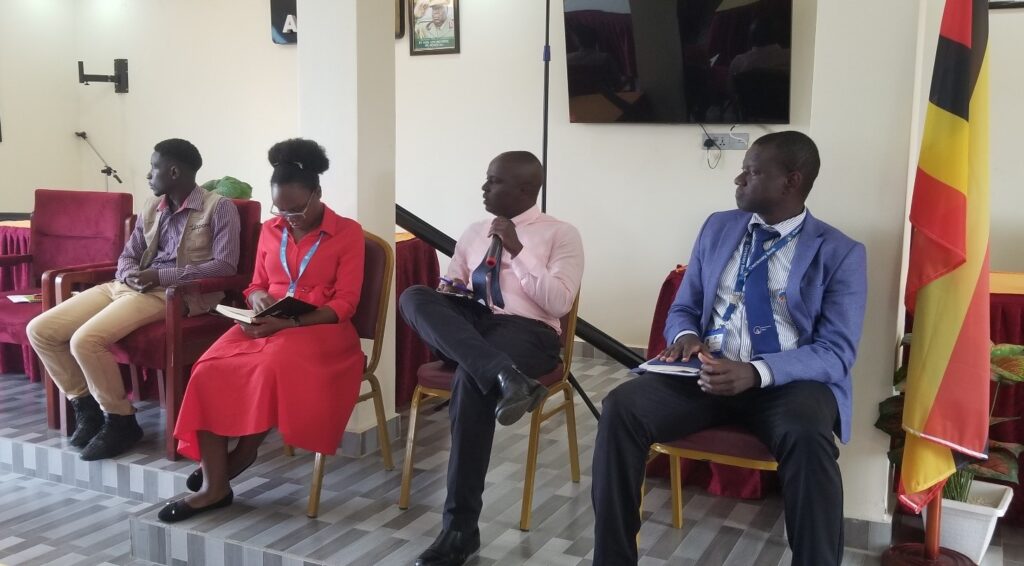FINANCIAL STRESS AND MENTAL HEALTH: STAKEHOLDERS IN ADJUMANI UNITE TO SUPPORT VICTIMS.
By Anzoo Evaline.
Financial stress has been identified as one of the leading causes of mental health challenges among both the refugee and host populations of Adjumani District. This is according to findings shared during a financial literacy and mental health awareness engagement held at Aragan Hotel on 1st October 2025.
The event, was organized by Train a Girl Uganda (TAGU), in preparation for the upcoming suicide awareness performance event under the theme: “Creating safe spaces for mental health conservation.”
The 4 hour event brought together representatives from Stanbic Bank, Centenary Bank, community leaders, and mental health advocates to address the growing link between financial hardship and psychological distress.

Speaking during the event, Mr. Langoya Manara, the Stanbic Bank Manager Adjumani, noted that a majority of families in the district continue to experience emotional strain due to poor financial management and rising economic pressures.
“One of the major contributing factors I have observed over time is even fellow colleagues failing to budget effectively and that tends to create a lot of stress. And then looking at different lifestyles. We all grew up in different communities whereby people come from different areas others have it at home and then you want to have the same thing. I have seen even in many years much as we are in the business of lending, the money business of giving out money. We try as much as possible to get people to borrow for projects that can generate income and not focus on borrowing for paying school fees”, Manara said.
Similarly, Mr. Denis Wokorach, the Manager of Centenary Bank Adjumani, emphasized the importance of developing strong financial principles and saving habits. He urged both refugees and host community members to seek guidance from financial institutions on how to better manage their finances.
“To manage financial stress. Of course, the first one is to investigate what is causing this financial stress. That is the basic role number one because if you know it, then you can manage it. So, the first thing is try to diagnose what is causing that financial stress. Is it overspending? Is it impulse buying? So, once you investigate what the cause is, then you can come up with ways to deal with it”, he said.
He added that “Of course, the other is to try and streamline your budget because you have the income, which are your incomes and the outputs. So, you need to know to see how to match them. And you don’t want to go and overspend. Save and say you know what? This month I’m going to save these shares. If you start from that side, you’ll find that you will be able to knock off some of the things that you don’t necessarily need”.
Mental health practitioners attending the event also raised concern over the increasing number of people showing symptoms of depression and anxiety due to financial struggles, family responsibilities, and unemployment.
Mr. Briani Asiimwe, a Mental Health advocate, who doubles as the Psychosocial Counsellor working with Tutapona, on his part urged the community to adopt the different ways of managing their stress without causing damage.
“For me, I view stress as something that is very normal. It depends on how it entered you. But if you are resilient enough, there are very many ways of coping which very many people don’t see, but like deep breathing, these people who commit suicide, the emotions are too much that even the thoughts are no longer there. All I want to do is jump this balcony, minus thinking about it”, Briani stated.
Participants who attended the engagement appreciated the discussion adding that it had helped them to gain knowledge on the importance of financial planning and saving culture.
Meanwhile, Dipio Francis, the Senior Probation and Social Welfare officer at Adjumani Local District Government, appealed to the Bank Managers to revise some of their harsh policies on loans/grants and other financial transactions that depress people who are seeking to gain access to government support.
“There are many government programs which are targeting the communities but the conditions are really harsh for this people so please the two bank managers around let’s try to minimize some of these conditions so that our people can access it easily especially the youths”, said Dipio.
The dialogue concluded with a call from local leaders urging both financial institutions and humanitarian partners to continue supporting financial literacy trainings, especially for youth and women groups, to promote sustainable livelihoods and reduce mental health burdens.
The event underscored the growing recognition that financial wellness is a crucial component of mental health, and that improving financial habits can significantly enhance the overall wellbeing of communities in Adjumani District.
END
